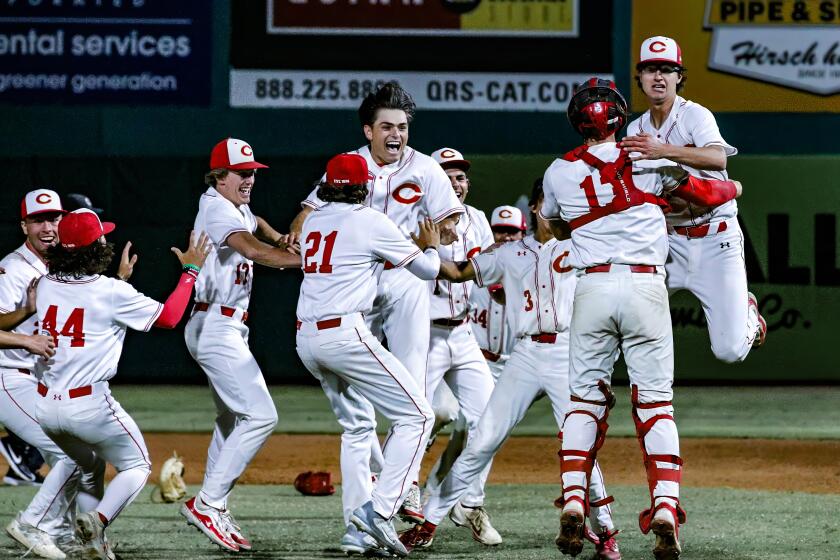Clause and effect in baseball
- Share via
When the Boston Red Sox offered Curt Schilling $8 million to pitch for them next season it might be assumed they did so with the expectation that he would stay in good enough shape to, you know, actually pitch.
Apparently not. Because the Red Sox also included a “conditioning bonus” that could earn the right-hander an additional $2 million if he stays trim enough all summer.
But even that didn’t seal the deal. Before Schilling would sign, the team packed his new contract with more pork than a Fenway Frank, including six season tickets, a private suite for each home start and free day care for all games in Boston, among other things.
What’s more, perk- and incentive-laden contracts like Schilling’s are becoming the norm. With the average major league salary expected to top $3 million this year, agents and clubs are using bonuses of all kinds to reward a player’s value.
“It’s come a long way,” agent Barry Axelrod said. “Things have changed.”
As a result, players can earn extra money by winning Gold Gloves or Silver Bats. They can cash in based on how many times they come to the plate or how many innings they stay on the mound. There are incentives for games started, games finished and for how many days one manages to avoid the disabled list.
The San Diego Padres once promised reliever Alan Embree a $50,000 bonus if he were named the starting pitcher in the All-Star game, even though he had never been an All-Star and hadn’t started a game since 1992.
Infielder Cesar Izturis’ contract with the St. Louis Cardinals will pay him $50,000 if he is named most valuable player of the league division series.
There is no MVP award in the division series.
There are even deals to be had when it comes to lodging. About a dozen players -- including new Dodger Andruw Jones, Tampa Bay’s Cliff Floyd and Kansas City’s Jose Guillen -- have new contracts that promise them private suites when their teams travel. For pitcher Greg Maddux the Padres went a step further, giving him a suite on the road as well as a team-paid membership in the tony Del Mar Country Club.
That’s not all. San Diego will give Maddux a $100,000 bonus if he wins the National League Cy Young or MVP award.
There are dozens of players who just have to get close to winning something to cash in.
For instance, if Houston’s Chad Paronto (career record, 6-11 with one save) is among the three best relievers in the NL next season, he gets an extra $25,000. (Paronto, hitless in four professional at-bats, also gets $25,000 if he finishes the season as the league’s best-hitting pitcher.)
In recent years such bonuses have become so prevalent -- and lucrative -- the Baseball Writers Assn. of America, whose members vote on the most prestigious honors, passed a resolution last month that would have prevented players from receiving money for winning BBWAA awards. The group’s board later moved to suspend the resolution.
While many contract clauses seem ridiculous, South Florida-based agent Juan Iglesias says they are often vital to getting deals done because they can help bridge the gap between what a team can afford and what a player thinks he should get.
“The market has gone up so high a lot of teams think it’s out of whack. And they say, ‘Forget about it. That’s way too much money to commit to a player,’ ” said Iglesias, who has negotiated incentive-laden contracts for Livan Hernandez, Antonio Alfonseca and Jose Canseco. “[So] they start being creative.
“If you meet somewhere in the middle because of performance, then everybody’s happy. You take away the fear of the team of paying that kind of money and losing it.”
A few years ago, when the Detroit Tigers were pursuing free-agent pitcher Carl Pavano, they had trouble keeping pace with the New York Yankees, Red Sox and Seattle Mariners when the bidding topped $40 million.
So Tigers owner and pizza baron Mike Ilitch reportedly offered Pavano a number of Little Caesars franchises to increase the value of the contract while staying within the team’s budget.
Pavano said no to the dough and signed with the Yankees.
But this winter Troy Percival negotiated a contract with Tampa Bay that includes a clause for a vintage automobile. And the Arizona Diamondbacks once wanted Troy Glaus so badly they offered to spend $1 million on his wife’s equestrian training.
“It’s a way to separate one deal from another,” Iglesias said.
Sometimes the gift-giving goes the other way. When Iglesias and Canseco reached a stalemate in negotiations with Tampa Bay several years ago, Canseco sent team owner -- and Notre Dame football fan -- Vince Naimoli a Fighting Irish helmet autographed by Joe Montana. Naimoli responded by adding a $6.5-million option to the Devil Rays’ offer.
Japanese players, meanwhile, have never been shy in requesting perks -- so much so that the size and breadth of those bonus packages have become a status symbol back home.
When pitcher Masahide Kobayashi negotiated his contract with the Cleveland Indians in early December, in addition to a $3-million annual base salary, the big league rookie got the club to agree to pay for eight round-trip business-class plane tickets between Japan and Cleveland, plus a translator, a personal trainer, a car and a moving allowance of up to $25,000.
He also got the team to promise not to demote him to the minors without his written consent.
So when Hiroki Kuroda signed with the Dodgers two weeks later, he made sure to one-up his countryman, asking for eight first-class tickets, an interpreter for his family as well as English lessons for himself, a personal trainer who doubles as a masseuse and a moving allowance of $30,000.
And the Dodgers, who will also pay Kuroda’s visa fees, agreed that he, too, cannot be sent to the minors without written consent.
“I guess,” Axelrod said, “it’s all about the leverage you have.”
More to Read
Go beyond the scoreboard
Get the latest on L.A.'s teams in the daily Sports Report newsletter.
You may occasionally receive promotional content from the Los Angeles Times.










